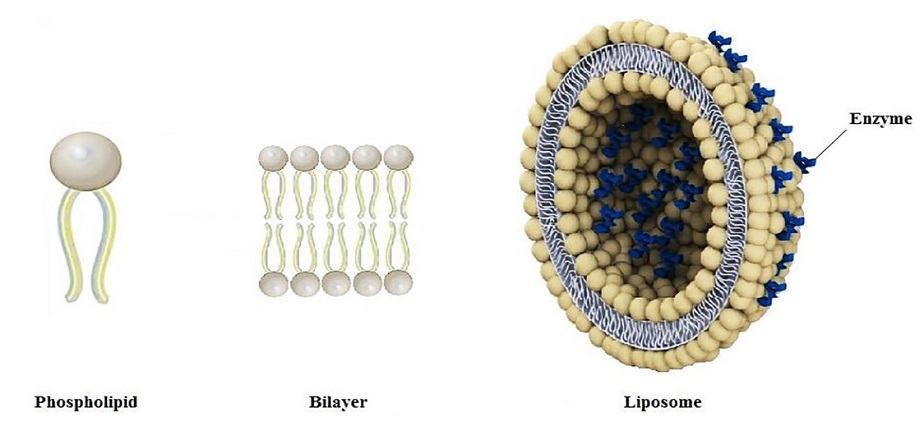Food-Grade Liposome Production
Liposomes are the most popular carriers used to design delivery systems for different compounds in pharmacological, biochemical, biological, food, and agricultural fields. Food-grade liposomes for the encapsulation and delivery of nutritional factors and functional ingredients are non-toxic, amphiphilic, and biodegradable, mainly in the three aspects of improving the stability and bioavailability of functional nutrients during storage and digestion, controlling the targeted and timed release of the encapsulated substances and improving food texture.
 Figure 1. An illustration of a liposomal structure and entrapment/anchoring of enzymes. (Mohammadi, A., et al., 2021)
Figure 1. An illustration of a liposomal structure and entrapment/anchoring of enzymes. (Mohammadi, A., et al., 2021)
Liposome Supplements
Nutritional supplements help to supplement a healthy diet when it is not possible to do so, ensuring adequate intake of essential vitamins, minerals, and antioxidants. However, differences in the production, absorption and delivery of certain nutrients may significantly affect exactly how much of your supplement intake will take effect as intended and how much will be metabolized and lost due to underutilization.
Liposomal supplements are a breakthrough nutrient delivery system that delivers active molecules directly at the site of great need for optimal nutrient utilization. Some nutrients such as vitamin C, vitamin D, magnesium, and glutathione are excellent alternative nutrients for liposomal delivery. The role of liposomal delivery is to bypass systemic functions in the body, including gastric acid catabolism, that would otherwise reduce the effectiveness of the nutrients.
Carotenoid Stabilization
Carotenoids are susceptible to different degrees of isomerization during food processing and storage by light, heat, oxygen, acids, and alkalis, and they are also affected to different degrees by chemical factors and enzymes during digestion in the gastrointestinal tract, causing a significant reduction in their stability and bioavailability. Therefore, to promote the application of carotenoids, it is necessary to take certain protective measures to improve their stability in the application system.
The molecular structure and incorporation concentration of carotenoids determine the kinetics, structure, and hydrophobicity of liposomal membranes. Liposomes with good water dispersion, low toxicity, and better biocompatibility can effectively improve the stability and bioavailability of carotenoids when loaded with carotenoids.
Fruit Active Hydrophobic Polyphenol Delivery System
The main secondary metabolites in citrus fruits and peels are rich in polyphenol flavonoids, mainly hesperidin and naringenin, and their glycosides, which have antioxidant, anti-inflammatory, anti-aging, anti-cancer, anti-diabetic, and cardiovascular disease prevention effects. However, the low water solubility of these active polyphenols limits their stability to light and heat during processing and storage and their significant sensitivity to environmental factors as well as their effective efficacy.
Naringenin can be loaded into the hydrophobic cavities of nanoliposomes by a green, organic solvent-free pH-driven method, thus greatly improving their water solubility.
Liposome Encapsulation
- Lipids. Molecules such as DHA, eicosapntemacnioc acid (EPA), and essential oils contain unsaturated bonds and are susceptible to structural damage by oxidation and light, and their decomposition is accelerated when they encounter metal ions or are exposed to heat. Encapsulation of lipids in liposomes can overcome the disadvantages of biological instability and poor water solubility and improve their absorption in the intestinal tract.
- Antioxidants. Since antioxidants are extremely sensitive to light, heat, oxygen, pH, and enzymes, liposome encapsulation technology can improve their stability and extend their shelf life on the one hand, and increase the bioavailability of antioxidants on the other.
- Proteins and enzymes. Liposomes can protect d proteins and enzymes in foods and can improve their stability during food heat treatment.
- Vitamins and minerals. The application of vitamins is limited by their susceptibility to oxidative denaturation caused by external environmental influences such as light, heat, or oxygen. Currently, there are many means to improve the efficacy of vitamins, among which liposomes have shown unique advantages in terms of biodegradability and the ability to encapsulate both hydrophilic and lipophilic vitamins. Liposome-embedded minerals can be used to fortify food matrices.
Liposomes can improve the solubility and dispersion of nutrients, enhance the absorption of nutrients by the human body, control the rate of nutrient release, and improve the solubility and dispersion of nutrients. Creative Biostructure offers you the development of food-grade liposomes with the advantage of high stability. Please feel free to contact us to submit your requirements and explore more possibilities of liposomes in the food industry.
Ordering Process
Reference
- Mohammadi A., et al. Liposomal/nanoliposomal encapsulation of food-relevant enzymes and their application in the food industry. Food and Bioprocess Technology. 2021, 14: 23-38.
